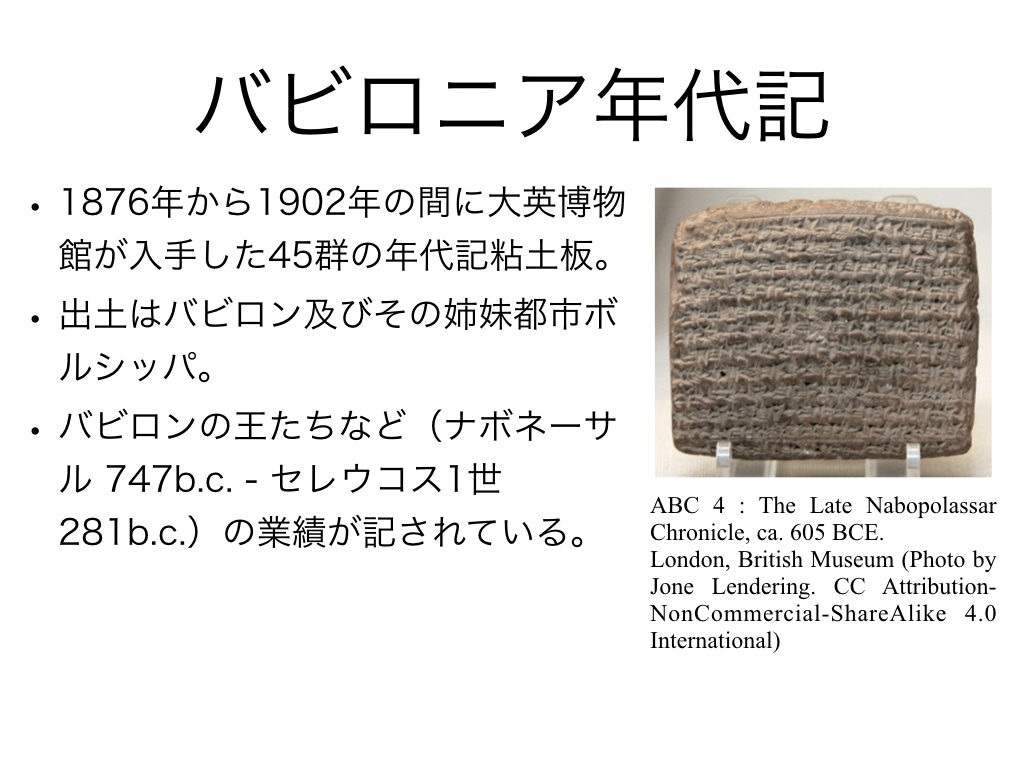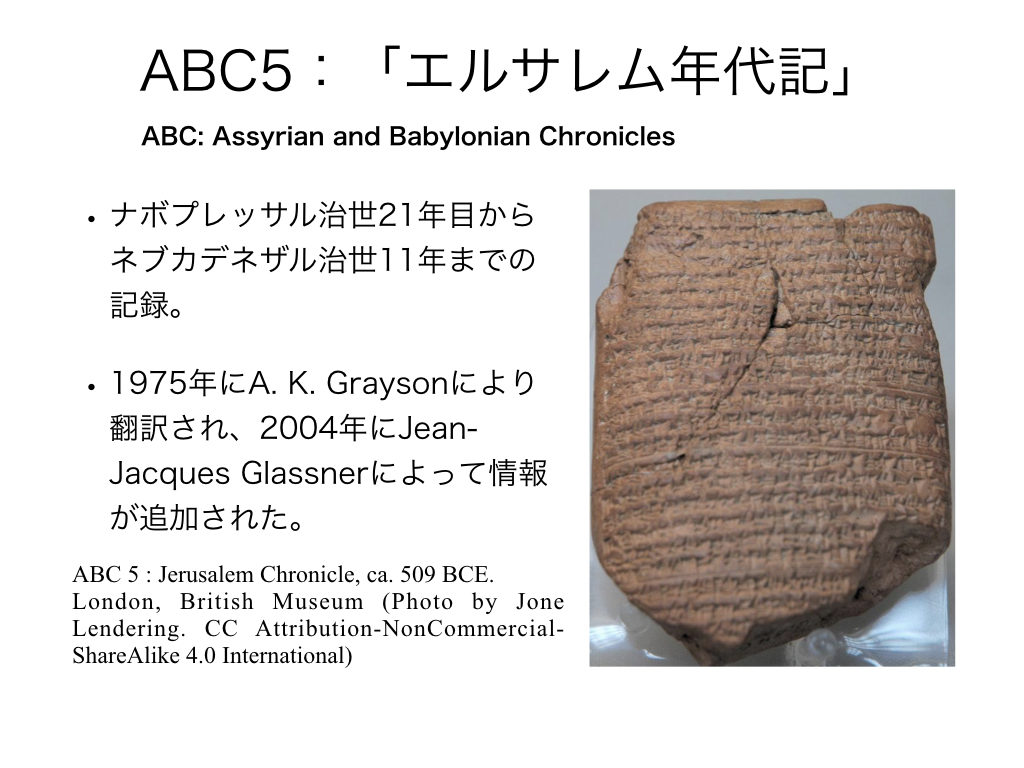歴史書としての聖書の読み方として、3月17日(日)はダニエル書に記されているネブカデネザルの大きな像の夢について話しました。
この最初の夢はダニエル書2章1節にはネブカデネザル王治世第2年の出来事として記されています。
ダニエル書1章1節のユダの王エホヤキムの治世第3年にネブカデネザルがダニエル達をバビロンに連れ帰ったのは、エジプトを攻めていた最中に父、ナボポレッサル王の死を知らされて、即位するためにバビロンに引き返した途中の出来事。ダニエル達はネブカデネザル即位の年から3年間「カルデヤびとの文学と言語とを学ばせ」られたとあります。
ここで、聖書に批判的な学者達の多くが、ネブカデネザル即位の年から教育を開始されたダニエルが、ネブカデネザル王治世の第2年に夢の解き明かしをしたことになっているが、これは3年の教育期間と記されている記述に矛盾すると主張しています。
この事に関して、primary source(一次資料)として1876年から1902年の間に大英博物館が入手した45群の年代記粘土板(出土はバビロン及びその姉妹都市ボルシッパ。ナボネーサル 747b.c. – セレウコス1世 281b.c.の業績が記されている)「アッシリア・バビロニア年代記」の内、通称「エルサレム年代記」と呼ばれている5群目の粘土版の解読翻訳がA.K.グレイソンによってなされ、聖書の記述の整合性が示されています(下表)。



エルサレム年代記英訳(www.livius.org より)
エルサレム年代記の英訳は以下の通り;
[Obv.1] In the twenty-first year [605/604] the king of Akkad [Nabopolassar] stayed in his own land, Nebuchadnezzar his eldest son, the crown-prince,
[Obv.2] mustered the Babylonian army and took command of his troops; he marched to Karchemiš which is on the bank of the Euphrates,
[Obv.3] and crossed the river to go against the Egyptian army which lay in Karchemiš.
[Obv.4] They fought with each other and the Egyptian army withdrew before him.
[Obv.5] He accomplished their defeat and beat them to non-existence. As for the rest of the Egyptian army
[Obv.6] which had escaped from the defeat so quickly that no weapon had reached them, in the district of Hamath
[Obv.7] the Babylonian troops overtook and defeated them so that not a single man escaped to his own country.
[Obv.8] At that time Nebuchadnezzar conquered the whole area of Hamath.
[Obv.9] For twenty-one years Nabopolassar had been king of Babylon,
[Obv.10] when on 8 Abu[15 August 605.] he went to his destiny; in the month of Ululu[September.] Nebuchadnezzar returned to Babylon
[Obv.11] and on 1 Ululu he sat on the royal throne in Babylon.
[Obv.12] In the accession year Nebuchadnezzar went back again to the Hatti-land and until the month of Šabatu
[Obv.13] marched unopposed through the Hatti-land; in the month of Šabatu he took the heavy tribute of the Hatti-territory to Babylon.
[Obv.14] In the month of Nisannu{{Spring 604.__ he took the hands of Bêl and the son of Bêl and celebrated the Akitu Festival.
[Obv.15] In the first year of Nebuchadnezzar [604/603] in the month of Simanunote[Late Spring.] he mustered his army
[Obv.16] and went to the Hatti-territory, he marched about unopposed in the Hatti-territory until the month of Kislîmu.[End 604.]
[Obv.17] All the kings of the Hatti-land came before him and he received their heavy tribute.
[Obv.18] He marched to the city of Aškelon and captured it in the month of Kislîmu.
[Obv.19] He captured its king and plundered it and carried off spoil from it.
[Obv.20] He turned the city into a mound and heaps of ruins and then in the month of Šabatu he marched back to Babylon.
[Obv.21] In the second year [603/602] in the month of Ajaru the king of Akkad gathered together a powerful army and marched to the land of Hatti.
[Obv.22] …] he threw down, great siege-towers he […
[Obv.23] …] from the month of Ajaru until the mon[th of …] he marched about unopposed in the land of Hatti.
[Obv.24-27] [Four lines missing]
[Rev.] [Several lines missing]
[Rev.1′] In the third year [602/601] the king of Akkad left and
[Rev.2′] in the month of […] on the thirteenth day, [the king’s brother] Nabû-šuma-lišir […]
[Rev.3′] The king of Akkad mustered his troops and marched to the Hatti-land.
[Rev.4′] and brought back much spoils from the Hatti-land into Akkad.
[Rev.5′] In the fourth year [601/600] the king of Akkad mustered his army and marched to the Hatti-land. In the Hatti-land they marched unopposed.
[Rev.6′] In the month of Kislîmu[End 601.] he took the lead of his army and marched to Egypt. The king of Egypt heard it and mustered his army.
[Rev.7′] In open battle they smote the breast of each other and inflicted great havoc on each other. The king of Akkad turned back with his troops and returned to Babylon.note[Apparently, Nebuchadnezzar suffered a defeat: in the next line, he reorganizes his army.]
[Rev.8′] In the fifth year [600/599] the king of Akkad stayed in his own land and gathered together his chariots and horses in great numbers.
[Rev.9′] In the sixth year [599/598] in the month of Kislîmu the king of Akkad mustered his army and marched to the Hatti-land. From the Hatti-land he sent out his companies,
[Rev.10′] and scouring the desert they took much plunder from the Arabs,[{{Probably nomads in what is now Jordan.] their possessions, animals and gods. In the month of Addaru the king returned to his own land.
[Rev.11′] In the seventh year [598/597], the month of Kislîmu, the king of Akkad mustered his troops, marched to the Hatti-land,
[Rev.12′] and besieged the city of Judah and on the second day of the month of Addaru he seized the city and captured the king.note[Jehoiachin; cf. Jeremiah 52.28-30; 2 Kings 24.8-17.]
[Rev.13′] He appointed there a king of his own choice,note[“Jehoiachin’s uncle Mattaniah became ling of Judah and changed his name to Zedekiah”: 2 Kings 24.17.] received its heavy tribute and sent to Babylon.
[Rev.14′] In the eight year [597/596], the month of Tebetu the king of Akkad marched to the Hatti-land as far as Karchemiš […
[Rev.15′] …] in the month of Šabatu the king returned to his own land.note
[Rev.16′] In the ninth year [596/595], the month of […] the king of Akkad and his troops marched along the bank of the Tigris […]
[Rev.17′] the king of Elam […]
[Rev.18′] the king of Akkad […]note
[Rev.19′] which is on the bank of the Tigris he pitched his camp. While there was still a distance of one day’s march between them,
[Rev.20′] the king of Elam was afraid and, panic falling on him, he returned to his own land.
[Rev.21′] In the tenth year [595/594] the king of Akkad was in his own land; from the month of Kislîmu to the month of Tebetu there was rebellion in Akkad.note
[Rev.22′] With arms he slew many of his own army. His own hand captured his enemy.
[Rev.23′] In the month of […],note he marched to the Hatti-land, where kings and […]-officials
[Rev.24′] came before him and he received their heavy tribute and then returned to Babylon.
[Rev.25′] In the eleventh year [594/593] in the month of Kislîmu, the king of Akkad mustered his troops and marched to the Hatti-land.
ダニエル書1・2章に関係する部分の日本語訳
この中でダニエル書1章と2章に関係する部分を日本語訳(私訳)したのが次の通り;
[行.1] 21年目 [605/604BC]にアッカドの王[ナボポラッサル] は自らの国に留まり、彼の長男で王位継承者であるナブカデネザルは、
[行.2] バビロンの軍を集め部隊を指揮した;彼はユーフラテス川のほとりにあるカルカメシに進軍し、
[行.3] カルカメシに陣取っていたエジプト軍に向かった。
[行.4] 彼らは互いに戦い、エジプト軍が彼の前から撤退した。
[行.9] ナボポレッサルは21年間バビロンの王であった。
[行.10] アブーの8日[8月15日 605BC]彼の運命にたどり着いた時; ウルル[9月]にネブカデネザルはバビロンに戻り、
[行.11] ウルルの1日にバビロンの王座に座した。
[行.15] ネブカデネザルの第1年 [604/603]、シマヌ[晩春]の月に彼は兵を集め、…
[行.21] 第2年 [603/602] アジャル[春]の月にアカッドの王(ネブカデネザル)は強力な軍隊を集めハッティの地へ進軍した。
文献
1) Caroline Waerzeggers, The Babylonian Chronicles Classification and Provenance Journal of Near Eastern Studies 71/2 (2012), 285–298.
2)伝統的立場;Miller, S. R. (1994). Daniel (The New American Commentary Vol. 18, p. 95). Nashville: Broadman & Holman Publishers.
3)批判的立場:Collins, J. J., & Collins, A. Y. (1993). Daniel: a commentary on the book of Daniel. (F. M. Cross, Ed.) (p. 166). Minneapolis, MN: Fortress Press.
まとめ
以上、この物語の年代に関して聖書学者は大きく2つの立場をとります。しかし、極端な言い方をすれば、これはどうでも良いことかもしれません。聖書の箇所として重要なのは次の箇所でしょう;
2:44 それらの王たちの世に、天の神は一つの国を立てられます。これはいつまでも滅びることがなく、その主権は他の民にわたされず、かえってこれらのもろもろの国を打ち破って滅ぼすでしょう。そしてこの国は立って永遠に至るのです。
2:45 一つの石が人手によらずに山から切り出され、その石が鉄と、青銅と、粘土と、銀と、金とを打ち砕いたのを、あなたが見られたのはこの事です。大いなる神がこの後に起るべきことを、王に知らされたのです。その夢はまことであって、この解き明かしは確かです」。
結語
歴史書としての聖書の読み方で、この話(ダニエル書2章)から私たちが学ぶべきことは、
神はその時代の人々に知ってもらうべきことを、その時代の人々に一番伝わりやすい形で伝えてる、ということです。先ず、
(1)ダニエルが他の誰にも当てることができなかったネブカデネザル王の夢を当てて解くという奇跡を通して当時の最高権力者(ネブカデネザル王)に、ダニエルの信じる神が本物であることを知らしめました。
(2)その後、ダニエルが神の国の到来があることを告げるのだが、先の出来事があったために彼の話は信憑性を持って民に伝わり、民は希望と平安を得ることができました。
また、時代は変わり、現代の私たちは、彼の予言(彼はこの地の支配者の移り変わりを予言していた)が正しかったことを歴史的記録として知ることができます。従いまして、
(3)現代の私たちも、神は歴史の移り変わりを予告し支配している存在である、ということを知ることができます。